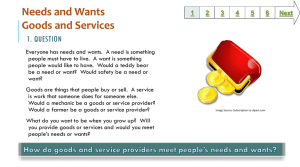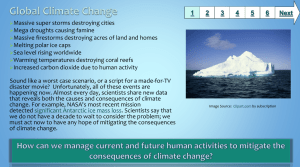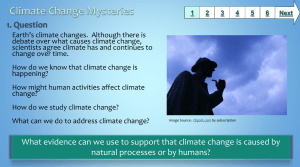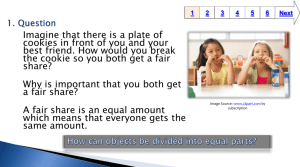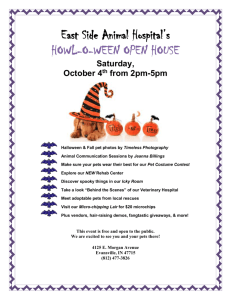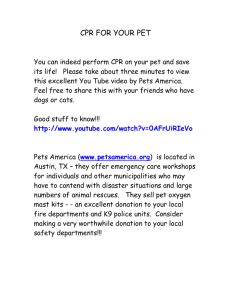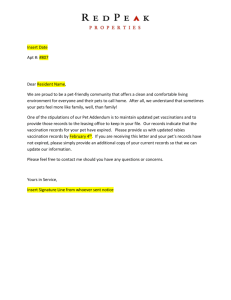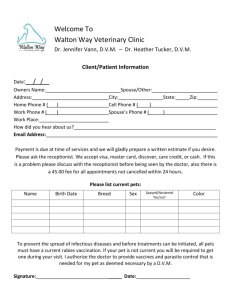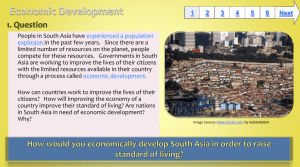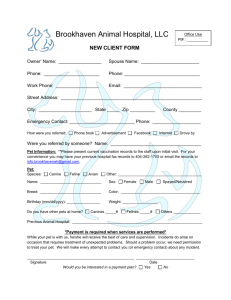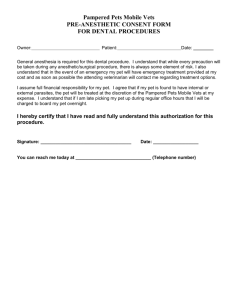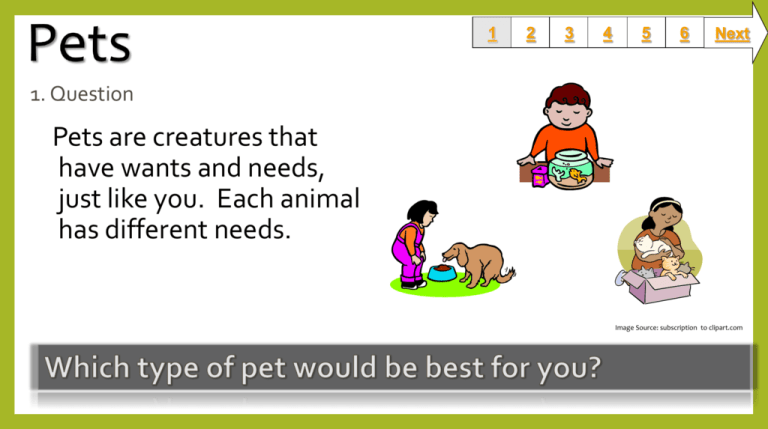
1
2
3
4
5
6
Next
1. Question
Pets are creatures that
have wants and needs,
just like you. Each animal
has different needs.
Image Source: subscription to clipart.com
2. Information Sources
1
2
3
4
5
6
Next
Let’s find out how to take
care of different pets so
you can decide which pet
is best for you.
Image Source: Brain Pop Jr.
Click on the image to play the video.
*NOTE: Go to the BCPS Database page and click on
BrainPOP Jr., then return to this slide and click on the video
link above.
3. Student Activity
1
Image Source: Subscription to clipart.com
2
3
4
5
6
Image Source: Pebblego.com
Image Source: Voki.com
Introduction
Notes Chart
Information Resources
Next
4. Assessment Activity
Summative Assessment:
Scenario: You would like to have a pet
at your house but your parents say
no. You need to convince your
parents and tell them what pet would
be best for you and your family.
Assignment: Create a poster that
demonstrates two reasons that the
pet you chose would be the best for
you.
1
2
3
4
5
6
Next
5. Enrichment Activities
1
2
3
4
5
Image Source: Brain Pop Jr.
Image Source: Brain Pop Jr.
Image Source: Brain Pop Jr.
Reading Rainbow
Pet Stories You Don’t
Have to Walk
Image Source: subscription to clipart.com
Image Source: subscription to clipart.com
Image Source: subscription to clipart.com
6
Next
6. Teacher Support Materials
Kindergarten and Library Media
Maryland State Curriculum
K.3.E.1. Develop an awareness of the relationship of features of living things and their ability to satisfy basic
needs that support their growth and survival. a. Make observations of the features and behaviors of many
different kinds of animals within an environment to identify and begin building a list of some of the basic
needs these organisms share, such as water, air, etc.
Common Core State Standards
1
2
3
4
5
6
Time Frame:
4-5 50 minute lessons
Differentiation strategies for this lesson: Direct instruction will be
needed in the beginning of each lesson to review with students how
to manipulate the websites and how to take proper notes. Most
students will then be able to work independently once the review is
given and they can begin taking notes. Notes may be written from
copying from the text, developmental spelling and/or illustrations.
Reading: 1. Read closely to determine what the text says explicitly and to make logical inferences from it; cite
specific textual evidence when writing or speaking to support conclusions drawn from the text.
Writing: 7. Conduct short as well as more sustained research projects based on focused questions,
demonstrating understanding of the subject under investigation.
Standards for the 21st Century Learner
1.1.6 Read, view, and listen for information presented in any format (e.g. textual, visual, media, digital) in
order to make inferences and gather meaning.
2.3.1 Connect understanding to the real world.
ISTE - National Educational Technology Standards for Students
3. Research and Information Fluency: Students apply digital tools to gather, evaluate, and use information.
d. Process data and report results.
4. Critical Thinking, Problem Solving, and Decision Making: Students use critical thinking skills to plan and
conduct research, manage projects, solve problems, and make informed decisions using appropriate
digital tools and resources. c. Collect and analyze data to identify solutions and/or make informed
decisions.
Learning Styles addressed in this lesson: Visual, Auditory, Kinesthetic,
Reflective
Notes to the teacher:
•Designed for teacher instruction on the first slide, as well as modeling how
to log on to pebblego.com and navigate through the website.
•The note taking worksheet should be copied ahead of time for the students
to use.
•When logging onto Pebblego.com and search pets. The students will be
able to research various pets on this site.
•It is recommended that the teacher model how to use the note taking form
after viewing pet information from pebblego.com. It is suggested that all
children complete one pet section together with the teacher modeling.
•Use the log in information to navigate to the Wixie page for the final poster
project.
•If there is not ample time to share their finished product, they could be
displayed around the media center for all to see.
Last updated: July 2014
Created by Brenda Chamberlain, Library Media Specialist Intern
BCPS Slam Dunk Research Model, Copyright 2013, Baltimore County Public Schools, MD, all rights reserved. The models may be used for educational, non-profit school use only.
All other uses, transmissions, and duplications are prohibited unless permission is granted expressly. This lesson is based on Jamie McKenzie’s Slam Dunk Lesson module.

